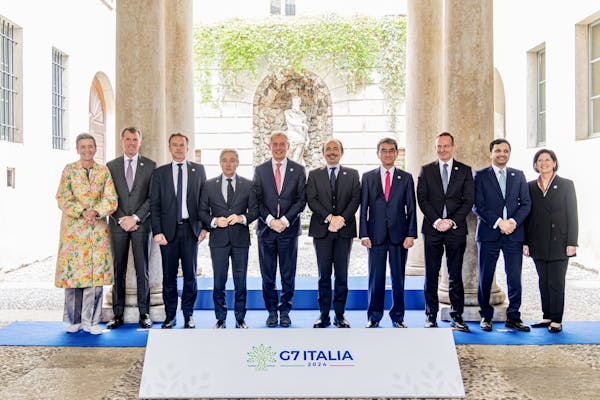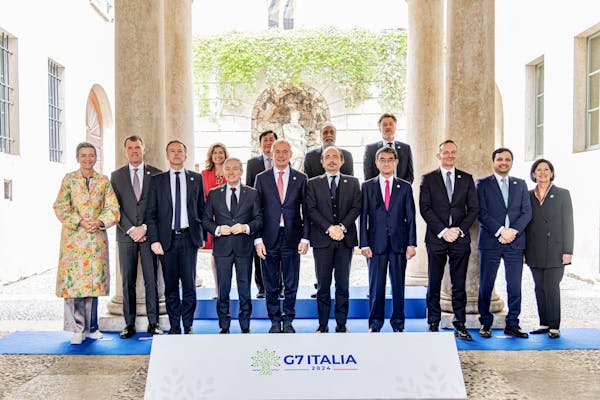G7: Ministerial Declaration on Industry, Technology, and Digital
Today, March 15, in Trento, the G7 Ministers adopted the Ministerial Declaration on Industry, Technology, and Digital.
This morning has marked the conclusions of the G7 Ministerial Meeting on Industry, Technology and Digital, organised by the Italian Presidency in Trento. Senator Alessio Butti, Undersecretary of State for technological innovation, chaired the meeting sessions ending with the adoption of the Ministerial Declaration by G7 Members.
"The G7 Ministerial Declaration on Industry, Technology, and Digital significantly contributes to the global discourse on the governance of transformative technologies like Artificial Intelligence. Today, G7 members reaffirm the priority of developing and using AI in an ethical manner, aligning with the principles and values that underpin our democracies, for the good of our citizens, and the resilience and wellbeing of our societies and economies," emphasised Undersecretary of State, Alessio Butti.
Key Points of the Digital and Tech Chapters of the Declaration
The Ministerial Declaration is the result of a collaborative process among G7 members, the foundations of which were laid during the Japanese G7 Presidency in 2023.
The Declaration represents an important step towards advancing the global dialogue on the ethical and responsible use of Artificial Intelligence, and in particular, it focuses on the use of AI in the public sector. Furthermore, the Declaration identifies as priorities for G7 Members the development of human-centered, secure, and efficient digital public services, with the aim of simplifying the lives of citizens and cutting red tape for companies.
In particular, the priorities for the digital transformation of the public sector include:
- Artificial Intelligence in the public sector: AI represents one of the most fascinating and promising fields of innovation, with the potential to significantly improve our lives. The development, deployment and use of AI systems cannot ignore ethical considerations and has to respect the democratic values of G7 members, as well as the protection of human rights and fundamental freedoms, while preventing and mitigating possible misuse and abuse.
- Digital government: access to digital public services contributes to social inclusion and can increase citizens’ trust in public administration. The Declaration also refers to the notion of Digital Public Infrastructure (DPI), as noted by the 2023 Indian G20 Presidency as an approach that could foster resilience, catalyse sustainable growth, and promote more inclusive and equitable access to digital services.
- Furthermore, the Italian Presidency commits to advancing the outcomes of the Hiroshima Artificial Intelligence Process (HAIP) to develop, together with stakeholders, appropriate mechanisms for monitoring the voluntary adoption of the “International Code of Conduct for Organisations Developing Advanced AI Systems.”
AI Toolkit and Compendium of Digital Public Services
The Italian Presidency, with the active support of the G7 membership, aims to translate the principles for safe, secure, and trustworthy AI into concrete and actionable policies. To this end, the Presidency will develop a Toolkit for AI in the public sector, to be used as a working tool for the dissemination and ethical use of AI applications in the public sector.
Furthermore, the Presidency will produce the Compendium of Digital Public Services with the goal of collecting examples of how G7 governments are approaching and leveraging digital government services, and digital identity.
The Italian G7 Presidency
The G7 Ministerial Meeting on Industry, Technology, and Digital took place in Verona and Trento on March 14 and 15, 2024. The two days were respectively chaired by the Minister of Enterprises and Made in Italy, Adolfo Urso, and the Undersecretary of State for technological innovation, Alessio Butti.
Throughout the year, the Italian Presidency intends to advance its work to present the results achieved in the occasion of the G7 Leaders' Summit, which will be held in Apulia from June 13 to 15, 2024,



